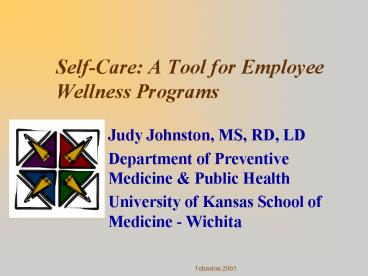SelfCare: A Tool for Employee Wellness Programs - PowerPoint PPT Presentation
1 / 22
Title:
SelfCare: A Tool for Employee Wellness Programs
Description:
Department of Preventive Medicine & Public Health ... Handbook of Eclectic Psychotherapy. J. Norcross. New York, Brunner/Mazel: 163-200. ... – PowerPoint PPT presentation
Number of Views:321
Avg rating:3.0/5.0
Title: SelfCare: A Tool for Employee Wellness Programs
1
Self-Care A Tool for Employee Wellness Programs
- Judy Johnston, MS, RD, LD
- Department of Preventive Medicine Public Health
- University of Kansas School of Medicine - Wichita
2
Outline
- Definitions
- Investing in Human Capital
- Social-Ecological Model
- Categories of Self Care
- Transtheoretical Model/Stages of Change
- Self-Efficacy
- Self-Care Covenants/Contracts
3
Self-Care is
- The actions taken by individuals towards their
own health and well-being - Self-care includes care to
- Stay fit maintain good physical mental
health - Meet psychological needs
- Prevent illnesses or accidents
- Care for minor illnesses long-term conditions
- Maintain health well-being after illness or
injury
Self-Care-A Real Choice UK Dept. of Health, 2005
4
Investing in Human Capital CASH
- Connection
- Autonomy
- Skill-Building Opportunities
- Healthy Norms
5
No man is capable of self-improvement if he sees
no other model but himself.
- Conrado I. Generoso
6
Social-Ecological Model
7
Physical Health Actual Causes of Death
- Tobacco (19)
- Poor Diet/Lack of Exercise (14)
- Alcohol (5)
- Infectious Agents (4)
- Pollutants/Toxins (3)
- Firearms (2)
- Motor Vehicles (1)
- Illicit Drug use (1)
McGinnis JM, Foege WH. Actual causes of death in
the United States, JAMA 1993 2702207-12
8
Physical Self-Care
- Healthy Diet
- Active Living
- Sleep
- Water
- Tobacco Use and/or Exposure
9
Effects of Environment
- Challenging
- Super-sized portions
- Advertising/mis-information
- Fast foods/Vending
- Lack of PA opportunities
- Sedentary jobs
10
Effects of Environment
- Supportive
- Variety
- Convenience Availability Accessibility
- Useful, Accurate Information
- Role Models
11
Mental/Emotional Self-Care
- Stress Relaxation
- Time Management
- Guilt, Shame Forgiveness
- Empowerment
- Parenting
- Days Off/Vacation
12
Social Self-Care
- Social support
- Motivation
- Relationship Building
- Nurturing your support network
13
Health Risk Appraisals
- Comprehensive assessments
- Categorical assessments
- Self-Assessment vs. Professional Assessment
14
Stages of Change Model
Prochaska, J. O. and C. C. DiClemente (1986).
The transtheoretical approach. Handbook of
Eclectic Psychotherapy. J. Norcross. New York,
Brunner/Mazel 163-200.
15
Keys to Success
- Make one change at a time
- Make a plan
- Set a specific measurable goal
- Write it down
- Get social support
- Additive goals
- Plan to succeed
16
Self-Efficacy
- What is it?
- Belief in the importance of goal
- Confidence that you can achieve the goal
- How to increase self-efficacy?
- Plan
- Small steps
- Buddy system
- Role models/mentors
17
Personal Health Covenant/Contract
- Commitment to self care
- Achievable
- Small steps
- Moves you one level in stages of change
- Active
- Buddy system
18
Covenant/Contract Process
- Review self assessments
- Personal Self-Care Monthly Plan
- What
- How Much
- Why
- Barriers
- Plans to Overcome Barriers
- Accountability
- Monthly Reviews
19
The more familiar we are with our inner terrain,
the more sure-footed our teaching our living
becomes.
- Parker Palmer
20
The Role of Policy
- Places value on health behaviors
- May provide incentives
- Creates Role Models
- Commits Resources
21
Partnership
- Employers
- Supportive environment
- Supportive policies
- Role models
- Resources
- Employees
- Commitment to self-examination
- to self-care
- Shared responsibility
- Sphere of influence
22
Employee Self-Care
- Both Employers Employees invest and both reap
benefits!































